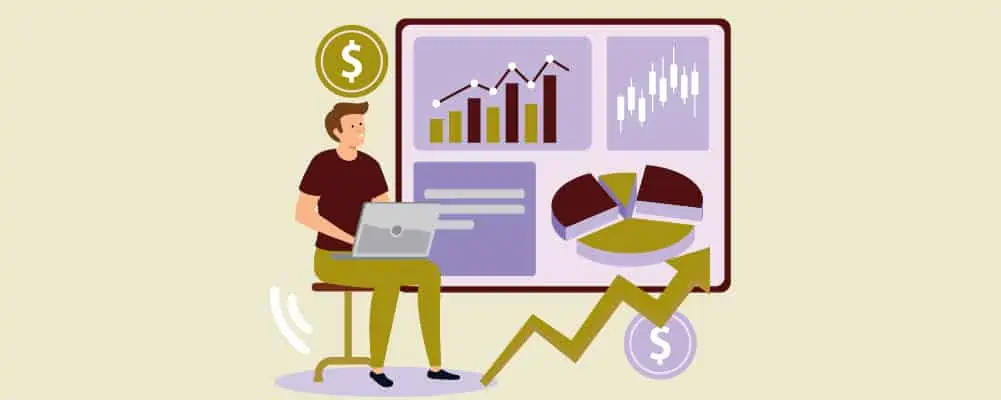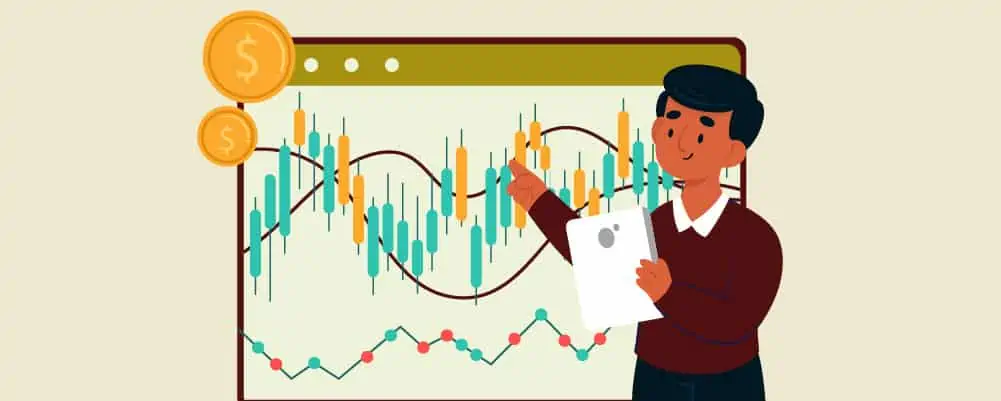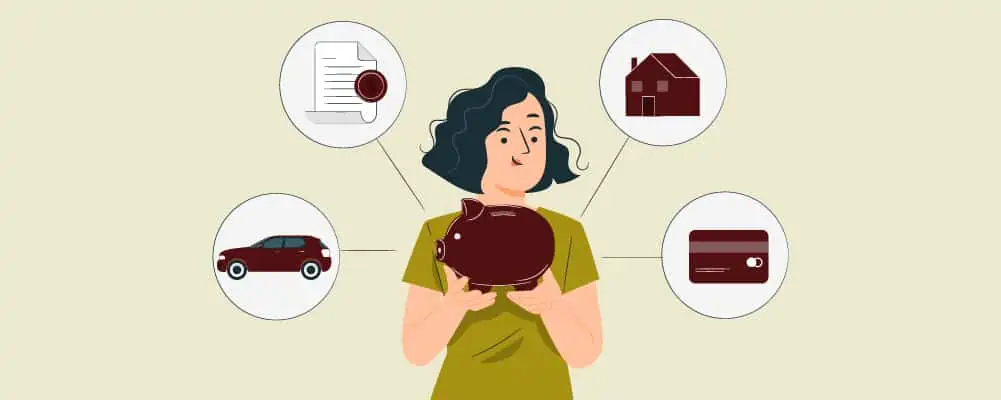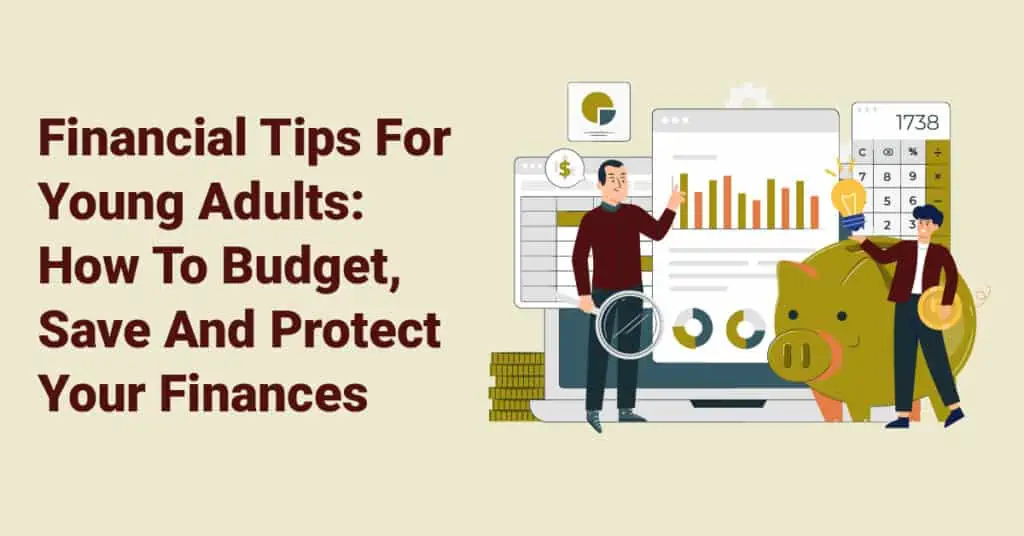Introduction
Any knowledge of money matters could equal financial stability for either the short or long-term period.
With the cost of universities and general living expenses on the rise, young adults nowadays are left in a vulnerable financial position more than ever before.
Couple this with a lack of understanding about properly budgeting, saving, and protecting themselves and their finances, the results are a serious financial crisis.

Taking control of your finances is something that becomes increasingly important as you grow older.
For example, you will one day be at a point where you are living independently and paying for utility bills, food, and rent by yourself. If you lack understanding of how to do this, you could land yourself in hot water.
Having such responsibility thrust onto your shoulders can be extremely stressful and overwhelming. Yet if you take the time to learn how to actively budget and manage your finances as a young adult, you will set yourself up for financial success for the rest of your life.
Continue reading for some of the best financial tips to properly budget, save, and protect your finances.
Personal Finances

What Are Your Personal Finances?
The term personal finance covers a variety of financial opportunities that might otherwise have been overlooked. Notably, it revolves around saving, investing, and managing your money.
Your personal finances will typically include mortgages, banking, insurance payments, planning for retirement, estate planning, and many investments you might make.
Essential Rules
As a young adult, there are a few essential financial rules that you must follow. Not only will this make you more aware of your money, but it will also help you to use it more effectively.
1. Have Self-Control. Use Cash As Much As Possible
If you’ve been exposed to an environment where you have been taught self-control from a very young age, you can count yourself lucky. This will be extremely helpful in helping you to get on top of your finances.
If you haven’t been exposed to such an environment in your life, you should learn it as soon as possible.
The sooner you have an awareness of financial self-control, the quicker you’ll be in control of your personal finances.
An important way of exercising any type of financial self-control is to put all of your purchases onto a debit card instead of a credit card.
This is because credit cards are essentially high-interest loans that may be difficult to pay off in the long term unless you can afford to pay off the balance each month.
Sticking with a debit card will deduct funds immediately without the additional fees, which may prove to be a better choice for you. Using a debit card also means you can make cash withdrawals from an ATM without having to pay extra.
By carrying cash around, you are covering yourself in the event that a credit or debit card payment isn’t working or does not go through.
Plus, it will help you to keep track of your exact spending, and you might even feel more motivated to not spend the funds you have!
2. Educate Yourself
If you are completely unable to manage your financial situation, then you will likely find that other people will begin to micromanage it on your behalf.
While some of these people may honestly be trying to give you some advice, others might not be so well-meaning with their intentions.
Rather than only abiding by the financial advice of people who don’t know your financial situation’s ins and outs, you should step up and take charge.
Feel free to read our blog or watch some videos with enough general information to help you get by.
Most importantly, you cannot allow anyone to throw you off track.
Regardless of whether this is a spouse, a friend, or a family member, never let yourself be coerced into doing something that will have a negative financial impact.
3. Learn How Far Your Money Can Go
An important part of protecting your finances is learning how to budget, and figuring out exactly how far you can stretch your money. The general rule of thumb is to never let your total expenses exceed the income you are on – but there is a lot more to the practice.
You can begin to explore this by making a firm personal spending plan to keep track of your income and any outgoing expenses. Noting down every single purchase you make might prove to be a valuable wake-up call, and the first step in curbing unexpected expenses.
For example, you could swap your daily purchase at your favourite coffee shop for homemade coffee. Additionally, keeping larger expenses such as rent as low as possible might even save you more money over a longer period.
Don’t opt for the most decorated home if you truly cannot afford to do so, and instead stick with somewhere in your budget.
4. Understand Taxes
Even before you receive your first paycheck, you should understand how your money will be taxed.
Once you’ve received a starting salary figure from your employer, you should take the time to calculate whether you will have enough money post-tax to cover all of your financial obligations.
You will also want to ensure you can put some money aside into your savings account for emergencies. Thankfully, there are online systems that will do this type of calculation for you so you don’t need to stress yourself out.
All you will need for this is your total earnings figure, the tax amount, and the money you are left with.
Taking the time to learn about and do your own taxes and knowing how to legally reduce tax could prove to be extremely beneficial to you and any relevant parties.
It is relatively straightforward to do and means you won’t need to fork out the money for the services of a tax professional.
We suggest opening up an SRS account first and then finding ways to invest your SRS funds.
How To Budget Your Finances

Start Budgeting As Soon As Possible
As a young adult, you have the rest of your life ahead of you. This is a future you want to be somewhat prepared to deal with. The first step will be to take the steps to begin building, budgeting, and securing your finances.
Learning to budget money from a young age means that you are far less likely to end up in crippling debt.
Not only will you be more aware of your spending habits but you will have the tools and mindset to start being smart with your budgeting.
Budgeting as soon as possible will help you to maintain a greater credit rating as you progress through your life, and may even make you less susceptible to being caught out by unexpected costs.
Essentially, budgeting as soon as possible will help you to live within your means without getting yourself tangled up in a lot of tricky financial situations.
Careful budgeting could also be the key to better planning your expenses so that you get the most enjoyment out of life without the additional burden and stress of money.
Set Your Goals Early
Setting firm and realistic goals as early as you can is an important step that could completely change the way you approach budgeting your money.
By visualising the item or experience that you are planning to enjoy in the future, you can work out a realistic timeline during which you can get your budgeting in order.
By realistic timeline, we mean understanding the key milestones you might face in your life.
For instance, if you’re wanting to pay off the entirety of your wedding in 2 years, you will need to work out how much money you’ll need to put aside each month throughout that period.
A general rule of thumb in terms of setting efficient budgeting goals is to follow the Specific, Measurable, Attainable, Relevant, and Time-bound (SMART) method.
This will push you further, provide you with a sense of direction, and will also organise you enough to ensure you meet your budgeting targets.
Feel free to make a list of your budgeting goals and save them onto your phone, pin them to a notice board, or even write them in the front of your favourite journal to keep yourself on track.
Calculate Your Net Income Correctly

The core foundation of having an effective and successful financial budget is to correctly calculate your net income, also known as your take-home salary.
This is the overall amount of pay (salary or wages) that you are left with after paycheck deductions have been calculated. Some of these deductions include employer-provided programs like health insurance and retirement plans, voluntary contributions, and taxes.
You will usually receive a breakdown of these deductions for each paycheck you receive which makes it relatively easy to keep track of the exact amount you will receive as your monthly income.
It’s important that you correctly calculate this figure as it will give you a detailed picture of your financial health while allowing you to make the most of the money you have.
For example, overestimating your take-home salary could lead you to excessive spending and might even lead you into unwanted debt if you don’t correctly budget for bills and other responsibilities.
By regularly balancing your take-home salary and splitting it into sections you can immediately increase the efficiency of your salary and put yourself in a better financial position.
Stick To The 50/30/20 Rule
Wise budgeting is the key to complete financial control. However, many people might still struggle with where exactly to begin this process.
The simplest thing you can do is split your income into three categories to ensure that you meet all of your expenses and your saving needs. These categories are as follows:
Needs (50%)
Half of your household income can be spent on necessities like household bills, groceries, loan repayments, transport, and other essential payments.
This is the more practical side of financial planning and budgeting that will always take up the vast majority of your monthly salary.
Flexible Spending (30%)
This percentage of your monthly salary can be set aside for your personal enjoyment. For example, you can spend this money on monthly subscriptions and streaming services, clothing, hobbies, or holidays.
Savings (20%)
The remainder of your monthly income salary should ideally be saved for long-term expenses and emergencies. This could be for your retirement fund or even as a downpayment on a new home.
Adjust Your Spending According To Your Budget

After documenting your total take-home amount, you can then make necessary adjustments to ensure that you do not overspend.
This will be especially important in the months when you need to adjust your budgeting system due to having additional expenses to pay out, such as a minor car or home repair.
Whether you need to temporarily cancel subscription services or forgo that night out that you’ve been planning to attend, making relevant adjustments to your monthly budget will not be an extremely difficult thing to do.
If the numbers are still not adding up properly for one month, then you could turn your attention to analysing your fixed monthly expenses the next time you receive your take-home salary.
As an example, you might want to compare different life insurance policies to ensure you’re paying the least amount of money for the best coverage suited to you.
Review Your Budget Each Month
After your budget has officially been set then you must ensure that you are constantly reviewing it to stay on track.
Doing this every month could have many benefits for your finances and will hold you accountable for everything you spend.
It’s important to note that a few aspects of your monthly budget will not be set in stone.
For instance, you might find yourself with an unexpected bonus or raise in work one month, or you may hit one of your budgeting goals and then want to set an even stricter one for the next month.
Whatever the situation may be, reviewing your budget every month is a crucial way of budgeting, saving, and protecting all of your finances as you move through your life.
How To Save Your Finances

Create A Separate Savings Account
If you want to safeguard your ability to budget for your long-term savings, then you may want to look into opening separate savings accounts.
One of these can be used to budget for your regular everyday expenses, such as bills or going out for meals, while the other can be used solely for your savings.
One of the easiest ways you can budget your finances is to set up automatic transfers to your savings account on payday. This will save you a lot of time and energy in terms of not having to make the transfer yourself every month.
You can then take this money out of your monthly budget
Plus, creating a separate savings account will make it easier for you to keep track of your financial progress and generally hold yourself accountable for all of the decisions that you make.
Estimate How Much You Can Save Each Month
You must be realistic with the amount of income that you receive in line with all of your savings goals.
For example, you don’t want to save over half of your available monthly income if you have lots of bills and subscriptions to pay.
Here, you should use the 50-30-20 budgeting strategy as a crucial guideline to ensure you are living within your means and preparing yourself in case of an emergency.
With this method, over 50% of your monthly salary is set aside for needs, 30% is for your wants, and then 20% is there to pay off any debt you’re in or to be transferred directly into your savings.
You could also transfer the 20% into an emergency fund that covers you if you were to face unexpected large expenses or lose your job.
Emergency funds are buffers that can be considered as a sort of insurance policy in place of relying on high-interest loans or credit cards.
But instead of paying large premiums to a third-party company, you are paying yourself money that can be used at a later date.
This cash can be accessed quickly and easily when it’s needed most.
Keep Track Of All Spending Habits

Another way of saving your finances is to keep track of all of your spending habits. This will help you to whittle down the ways that you can save some money.
Note down the fixed expenses you pay regularly such as your rent, phone bill, car payments, and utilities.
Then begin listing variable expenses like entertainment platforms you use, groceries, and petrol as this is an area where you might find it the easiest to cut back.
For example, search for everyday savings. If buying lunch will set you back $10 and making lunch at home comes to $4, you could curate significant savings over that period.
You could even contribute to a retirement fund or a college plan.
Analysing your bank and credit statements might be another good way to track your spending habits.
Highlight and circle all of your questionable expenses so that you can begin categorising all of your monthly expenditures.
Limit Your Unnecessary Expenses
On a similar note, you should be cautious about your expendable income to guarantee that you do not waste it all on unnecessary expenses.
Start by taking around $150 per month out of your take-home salary to spend on non-essential items and services so that you are not interfering with your savings or bill-paying money.
This also guarantees that you’ll have some type of emergency fund should you need it.
Wasting a lot of your monthly take-home salary on items that you want rather than need could set you back financially, which is something you most definitely do not want to experience.
If possible, look for discounts on discount websites such as Groupon when you’re shopping. This way you’ll save some money even when shopping!
Create A Short-Term Saving Plan
This involves planning for the more immediate future, which may include saving for an upcoming trip to a destination you’ve been wanting to visit, buying a birthday gift for a friend or family member, or even purchasing an item you’ve had your eye on, such as a bag or a new pair of shoes.
Having one of these plans on hand will give you the funds to cover unexpected expenses, fund life goals, and pay off a debt to alleviate stress and worry about your financial situation.
You can begin your plan by setting up an automatic direct debit from your checking account into your savings account every payday.
Whether you can transfer $50 or $250, this money will begin to build up over time.
You could even try out savings techniques like the 52-week saving challenge to cover the cost of an upcoming trip, a birthday, or a small purchase that you really want to make.
It involves saving $1 the first week, $2 the next, and so on. Then, by the end of the year, you should have almost $1,400 at your fingertips.
If you have made plans to purchase something big within the next couple of years (between one and five years away) then a short-term savings plan might be a great way of helping you meet your goals.
Create A Long-Term Saving Plan / Invest Your Money
A long-term saving plan is typically designed to cover events or goals that are going to happen years from now.
Generally, they help to cover the cost of larger and more costly things than a short-term savings plan would— and you can also take full advantage of any compounding interest to help your money grow.
Although you have more time to save up your money with a long-term saving plan, you must still be realistic about how much money you can truly save without putting yourself into financial difficulty.
As a result, it can often feel overwhelming to think about the total amount of money required for larger expenses such as paying for a car or home or adding to a retirement account.
Our best advice is to start with small, achievable goals and then increase this amount as you go.
You can then use the 50-30-20 rule to calculate how much money you are left to play with after paying your bills and split it into personal spending and your savings.
During this process, you must make sure to measure and adjust your long-term savings plan as you go.
Doing so will keep you on track with your progress and show you just how much money you need to save to reach your goals in a specific time frame.
Some relatively safer ways of investing your money would be to get an endowment plan, put it in a cash management account, or an annuity plan.
If you don’t mind taking additional risks and are pretty savvy, you can invest in ETFs and stocks via an online brokerage account like moomoo or Webull.
Many investors like to look at what Warren Buffett is doing and attempt to copy his portfolio. You could try this too!
Or should you want someone else to manage it for you, you can opt to talk to a financial advisor who can help you invest through an investment-linked policy or via iFAST.
Otherwise, robo advisors like Syfe could be an option for you.
How To Protect Your Finances

Plan For The Future As Much As Possible
The way you spend and save your money today could have a massive impact on the level of financial security that you experience in the future.
By planning and preparing your finances you can begin setting yourself up for a much better tomorrow.
Start by writing down what you want your financial situation to look like in 5 and then 10 years. Note down specific financial goals that you have and why you want to achieve them.
Having a plan in place will work to keep you on track.
Invest In Insurance
If you intend to meet all of your financial goals, you must invest in insurance. You must purchase insurance even if it’s only for the fact that you get tax deductions on many of the premiums that you pay.
Investing in insurance could even help you to plan for retirement, or to start up your own business later in life.
The earlier you begin to invest in your insurance policy, the more money you will have available at your fingertips to enjoy once you reach this stage of your life!
Some insurance plans also offer you the chance to invest small amounts of money that will accumulate over time. These funds could be used to help you purchase your dream home or pay for a wedding, among other things.
A good insurance policy will also safeguard the financial situation of your loved ones in the event of your death.
To start off, you can look into a health insurance policy together with death coverage via a term life insurance plan.
If your budget allows it, a critical illness policy is highly recommended as well.
Take Advantage Of Employee Packages
These are non-wage compensations that are typically offered by an employer to their employees.
Benefit packages generally encompass the perks and rewards that employees are granted as an alternative to monetary payments, including cash bonuses and salary.
They are usually an excellent way to supplement the salary of an employee.
Employee packages allow employees to look after themselves and their families, stretch salaries that little bit further, and help with planning for future events.
Generally, they offer great protection for finances and well-being.
Invest In High-Interest Rate Savings Accounts
If you’re looking to protect your finances for the long term, then you may want to invest in a high-interest-rate savings account.
These accounts are great as a middle ground for your money and provide interest rates that are around 25 times greater than a traditional savings account, all without the issues of a riskier investment.
By investing in one of these savings accounts, you are safeguarding your money in case something were to happen.
Overall, it is a safe and useful financial opportunity for you to earn a little extra without needing to do too much.
Keep Your Credit Score High
Your credit score is arguably the most vital measure of your total financial health. It shows lenders exactly how responsible you are when you use your credit.
In its simplest terms, the better your credit score is, the easier it will be to find approval for loans or credit lines.
So if you’re serious about saving, keeping your credit score high is the first step you need to take.
Credit cards are one of the main ways to build and maintain your credit score.
If you pay bills on time, monitor your card for fraudulent activity, and are generally aware of your spending habits, your credit score will remain high.
Think About Diversifying Your Income
Having a diverse income simply means that you draw earnings from various sources instead of just one job.
Taking the time to diversify your income will work to protect you in the case that you lose your job or are crushed by the weight of an unexpected bill that your job alone cannot supplement.
It is also a great way to ensure the stability of your financial future. Multiple income streams will create a safety net should your money dry up at any point.
You could try any of the following to diversify your income stream:
- Start a side hustle using one of your hobbies or interests. If you’ve invested some time and skill into it, you could make a steady income stream alongside your job!
- Invest in some real estate if you have the capital to do so.
- Trade stocks to secure some additional income without putting too much of your initial capital at risk.
Summary

These are some of the best and most effective financial tips you can follow if you are looking to budget, save, and protect your finances as a young adult.
Budgeting your money is a huge part of being an adult. It will take quite a bit of time and effort on your part to learn how to effectively budget your take-home salary each month.
Yet if you do it right, the benefits it could provide to you are more than worth the couple of small sacrifices you will have to make!
The earlier you learn to effectively budget your money, the better your financial situation will be!
But you don’t need to worry if you aren’t 100% sure of how to manage your finances just yet.
As a young adult, you have plenty of time to get your finances in order, make your mistakes, and eventually begin learning to budget and save up for the things you want the most in life.
Remember that you don’t need to implement every single point into your financial strategy, and should instead turn your attention to the tips and advice that will put you in a better financial position.
Interested to start planning for your future?
Talk to a financial advisor in our network, who we vet to ensure that you get only the best advice for yourself.










